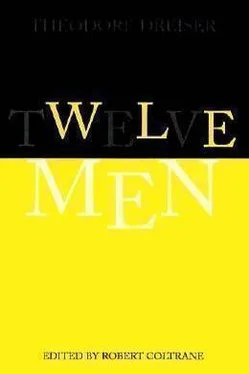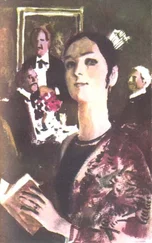Теодор Драйзер - Twelve Men
Здесь есть возможность читать онлайн «Теодор Драйзер - Twelve Men» весь текст электронной книги совершенно бесплатно (целиком полную версию без сокращений). В некоторых случаях можно слушать аудио, скачать через торрент в формате fb2 и присутствует краткое содержание. Год выпуска: 2014, Издательство: epubBooks Classics, Жанр: Биографии и Мемуары, на английском языке. Описание произведения, (предисловие) а так же отзывы посетителей доступны на портале библиотеки ЛибКат.
- Название:Twelve Men
- Автор:
- Издательство:epubBooks Classics
- Жанр:
- Год:2014
- ISBN:нет данных
- Рейтинг книги:4 / 5. Голосов: 1
-
Избранное:Добавить в избранное
- Отзывы:
-
Ваша оценка:
- 80
- 1
- 2
- 3
- 4
- 5
Twelve Men: краткое содержание, описание и аннотация
Предлагаем к чтению аннотацию, описание, краткое содержание или предисловие (зависит от того, что написал сам автор книги «Twelve Men»). Если вы не нашли необходимую информацию о книге — напишите в комментариях, мы постараемся отыскать её.
Twelve Men — читать онлайн бесплатно полную книгу (весь текст) целиком
Ниже представлен текст книги, разбитый по страницам. Система сохранения места последней прочитанной страницы, позволяет с удобством читать онлайн бесплатно книгу «Twelve Men», без необходимости каждый раз заново искать на чём Вы остановились. Поставьте закладку, и сможете в любой момент перейти на страницу, на которой закончили чтение.
Интервал:
Закладка:
"There you have it. There's American labor for you, at its best—union labor, the poor, downtrodden workingman. Look at him." We all looked. "This poor hard–working plumber here," and at that the latter stirred and sat up, scarcely even now grasping what it was all about, so suddenly had we descended upon him, "earns or demands sixty cents an hour, and this poor sweating little helper here has to have forty. They're working now. They're waiting for that little bit of lead to boil, at a dollar an hour between them. They can't do a thing, either of 'em, until it does, and lead has to be well done, you know, before it can be used.
"Well, now, these two here," he continued, suddenly shifting his tone from one of light sarcasm to a kind of savage contempt, "imagine they are getting along, making life a lot better for themselves, when they lie about this way and swindle another man out of his honest due in connection with the work he is paying for. He can't help himself. He can't know everything. If he did he'd probably find what's wrong in there and fix it himself in three minutes. But if he did that and the union heard of it they'd boycott him. They'd come around and blackmail him, blow up his barn, or make him pay for the work he did himself. I know 'em. I have to deal with 'em. They fix my pipes in the same way that these two are fixing his—lying on the grass at a dollar an hour. And they want five dollars a pound for every bit of lead they use. If they forget anything and have to go back to town for it, you pay for it, at a dollar an hour. They get on the job at nine and quit at four, in the country. If you say anything, they quit altogether—they're union laborers—and they won't let any one else do it, either. Once they're on the job they have to rest every few minutes, like these two. Something has to boil, or they have to wait for something. Isn't it wonderful! Isn't it beautiful! And all of us of course are made free and equal! They're just as good as we are! If you work and make money and have any plumbing to do you have to support 'em—Right by fours! Guide right! Forward!" and off we trotted, breaking into a headlong gallop a little farther on as if he wished to outrun the mood which was holding him at the moment.
The plumber and his assistant, fully awake now to the import of what had occurred, stared after us. The journeyman plumber, who was short and fat, sat and blinked. At last he recovered his wits sufficiently to cry, "Aw, go to hell, you ― ― ―!" but by that time we were well along the road and I am not sure that Culhane even heard.
Another day as we were riding along a road which led into a nearby city of, say, twenty thousand, we encountered a beer truck of great size and on its seat so large and ruddy and obese a German as one might go a long way and still not see. It was very hot. The German was drowsy and taking his time in the matter of driving. As we drew near, Culhane suddenly called a halt and, lining us up as was his rule, called to the horses of the brewery wagon, who also obeyed his lusty "Whoa!" The driver, from his high perch above, stared down on us with mingled curiosity and wonder.
"Now, here's an illustration of what I mean," Culhane began, apropos of nothing at all, "when I say that the word man ought to be modified or changed in some way so that when we use it we would mean something more definite than we mean now. That thing you see sitting up on that wagon–seat there—call that a man? And then call me one? Or a man like Charles A. Dana? Or a man like General Grant? Hell! Look at him! Look at his shape! Look at that stomach! You think a thing like that—call it a man if you want to—has any brains or that he's really any better than a pig in a sty? If you turn a horse out to shift for himself he'll eat just enough to keep in condition; same way with a dog, a cat or a bird. But let one of these things, that some people call a man , come along, give him a job and enough money or a chance to stuff himself, and see what happens. A thing like that connects himself with one end of a beer hose and then he thinks he's all right. He gets enough guts to start a sausage factory, and then he blows up, I suppose, or rots. Think of it! And we call him a man—or some do!"
During this amazing and wholly unexpected harangue (I never saw him stop any one before), the heavy driver, who did not understand English very well, first gazed and then strained with his eyebrows, not being able quite to make out what it was all about. From the chuckling and laughter that finally set up in one place and another he began dimly to comprehend that he was being made fun of, used as an unsatisfactory jest of some kind. Finally his face clouded for a storm and his eyes blazed, the while his fat red cheeks grew redder. " Donnervetter! " he began gutturally to roar. " Schweine hunde! Hunds knoche! Nach der polizei soll man reufen! "
I for one pulled my horse cautiously back, as he cracked a great whip, and, charging savagely through us, drove on. Culhane, having made his unkind comments, gave orders for our orderly formation once more and calmly led us away.
Perhaps the most amusing phase of him was his opposition to and contempt for inefficiency of any kind. If he asked you to do anything, no matter what, and you didn't at once leap to the task ready and willing and able so to do, he scarcely had words enough with which to express himself. On one occasion, as I recall all too well, he took us for a drive in his tally–ho—one or two or three that he possessed—a great lumbering, highly lacquered, yellow–wheeled vehicle, to which he attached seven or eight or nine horses, I forget which. This tally–ho ride was a regular Sunday morning or afternoon affair unless it was raining, a call suddenly sounding from about the grounds somewhere at eleven or at two in the afternoon, "Tally–ho at eleven–thirty" (or two–thirty, as the case might be). "All aboard!" Gathering all the reins in his hands and perching himself in the high seat above, with perhaps one of his guests beside him, all the rest crowded willy–nilly on the seats within and on top, he would carry us off, careening about the countryside most madly, several of his hostlers acting as liveried footmen or outriders and one of them perched up behind on the little seat, the technical name of which I have forgotten, waving and blowing the long silver trumpet, the regulation blasts on which had to be exactly as made and provided for such occasions. Often, having been given no warning as to just when it was to be, there would be a mad scramble to get into our de rigueur Sunday clothes, for Culhane would not endure any flaws in our appearance, and if we were not ready and waiting when one of his stablemen swung the vehicle up to the door at the appointed time he was absolutely furious.
On the particular occasion I have in mind we all clambered on in good time, all spick and span and in our very best, shaved, powdered, hands appropriately gloved, our whiskers curled and parted, our shoes shined, our hats brushed; and up in front was Culhane, gentleman de luxe for the occasion, his long–tailed whip looped exactly as it should be, no doubt, ready to be flicked out over the farthest horse's head, and up behind was the trumpeter—high hat, yellow–topped boots, a uniform of some grand color, I forget which.
But, as it turned out on this occasion, there had been a hitch at the last minute. The regular hostler or stableman who acted as footman extraordinary and trumpeter plenipotentiary, the one who could truly and ably blow this magnificent horn, was sick or his mother was dead. At any rate, there he wasn't. And in order not to irritate Culhane, a second hostler had been dressed and given his seat and horn—only he couldn't blow it. As we began to clamber in I heard him asking, "Can any of you gentleman blow the trumpet? Do any of you gentleman know the regular trumpet call?"
Читать дальшеИнтервал:
Закладка:
Похожие книги на «Twelve Men»
Представляем Вашему вниманию похожие книги на «Twelve Men» списком для выбора. Мы отобрали схожую по названию и смыслу литературу в надежде предоставить читателям больше вариантов отыскать новые, интересные, ещё непрочитанные произведения.
Обсуждение, отзывы о книге «Twelve Men» и просто собственные мнения читателей. Оставьте ваши комментарии, напишите, что Вы думаете о произведении, его смысле или главных героях. Укажите что конкретно понравилось, а что нет, и почему Вы так считаете.









